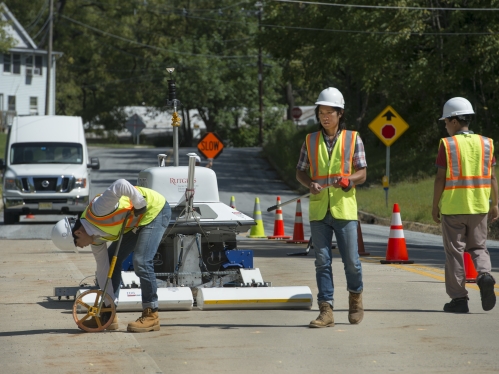
Civil Engineering
Our students tackle issues of global importance, including the sustainability of infrastructures, the impact of transportation on the environment, deploying emerging concepts and technologies in the construction of new facilities, and much more. Our faculty members are leading innovators with recent technological advances that include a robot that examines bridge surfaces using sophisticated tools and a 3-D geospatial mapping instrument.
Program Overview
Civil engineers design and create virtually all infrastructure, from bridges and highways to airports and sewage treatment facilities. Civil engineering is a gratifying field. The job outlook, opportunity for advancement, high salaries and sense of professional fulfillment led US News & World Report to rank civil engineering among its top 10 technology jobs of 2013.
The Civil Engineering program at Rutgers prepares graduates for the practice of civil and environmental engineering at the professional level with confidence and skills necessary to meet the technical and social challenges of the future. Our faculty members are technological innovators who take the lead on prominent state and national projects, while students engaged in our Engineers Without Borders chapter are committed to international water purification projects and food insecurity.
While we are the oldest engineering discipline at Rutgers, our current research is at the forefront of everything from intelligent transportation systems to air pollution control and high-speed railroad technology. Whether in the classroom or the laboratory, our world-class faculty members are dedicated to contributing to the development of a more sustainable economy, infrastructure, and environment.

Degrees Offered and Curricular Options
The civil engineering major is oversee by the Department of Civil and Environmental Engineering and offers the following degree programs:
• Bachelor of Science Degree in Civil Engineering
Options:
Structural Engineering;
Geotechnical Engineering;
Transportation Engineering;
Water Resources and Environmental Engineering;
Construction Management
• Bachelor of Science/Master of Science Dual Degree
• Master of Science Degree
• Doctoral Degree

Career Paths
- Construction engineer
- Environmental engineer
- Geotechnical engineer
- Structural engineer
- Transportation engineer
- Water resources engineer

Meet Jordan Dumas
“I value the resiliency I’ve gained from going through the School of Engineering program where I’ve been challenged to look at things from different perspectives.”


The Future Must Be Built